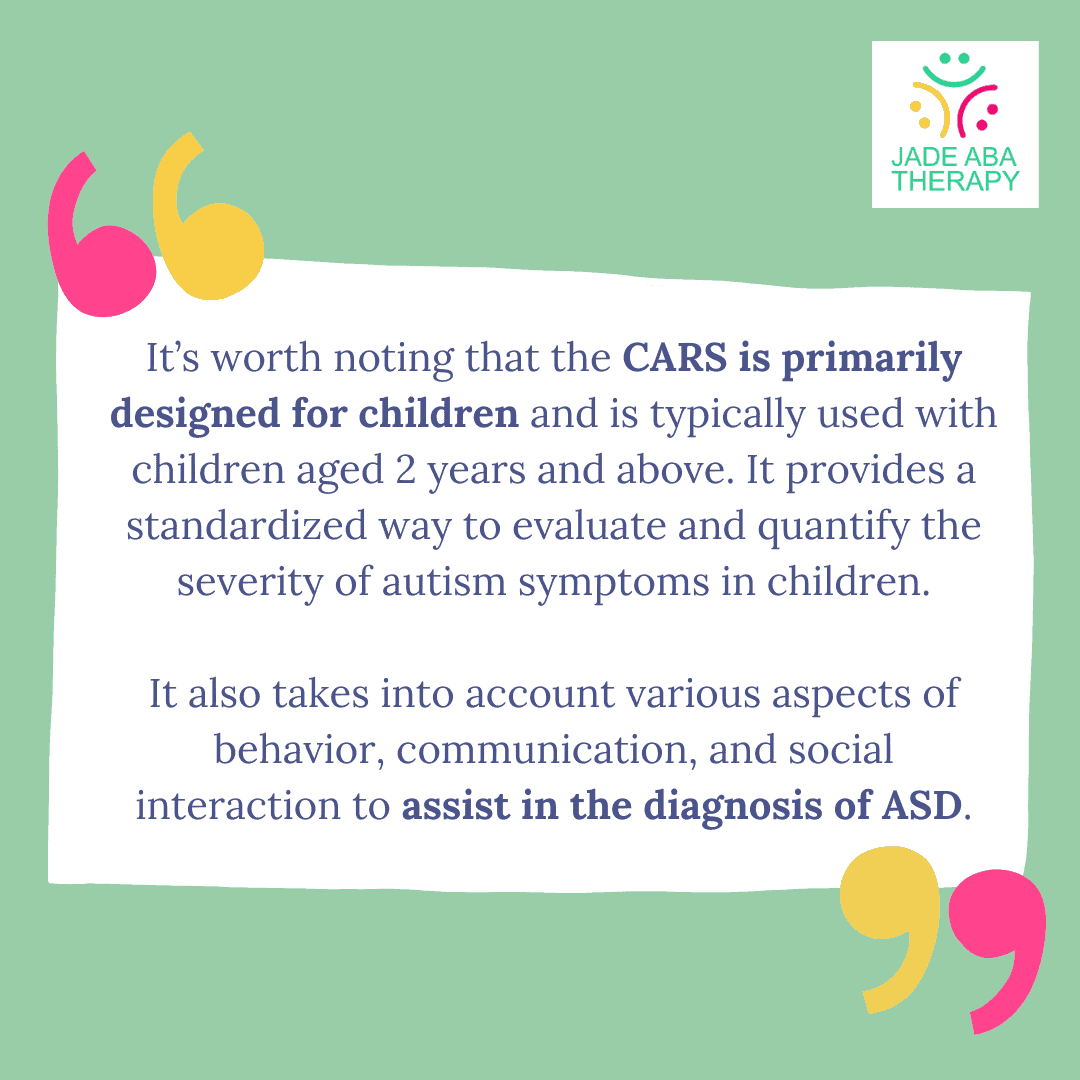The Childhood Autism Rating Scale (CARS) is a widely used tool as far as assessing autism in children goes. The CARS helps professionals observe and evaluate a child’s behavior, characteristics, and abilities to determine if they exhibit signs of mild, moderate, or severe autism.
The CARS is a 15-item behavioral rating scale specifically designed to identify and classify the level of Autism Spectrum Disorder (ASD) in children. Developed by Eric Schopler, Robert Reichier, and Barbara Renner, the CARS has become an important tool in diagnosing autism and distinguishing it from other developmental delay disorders like mental retardation.

Purpose of the CARS
The primary purpose of the CARS is to provide professionals with a standardized method for assessing and diagnosing autism in children. By observing the child’s behavior across various domains, the CARS allows for a comprehensive evaluation of their social interactions, communication skills, and repetitive or stereotypical behaviors.
Professionals use the CARS to rate a child’s behavior on each of the 15 items using a 4-point scale. The scores range from 15 to 60, with higher scores indicating more severe autism symptoms. The CARS assesses the child’s behavior and abilities against the expected developmental growth of a typical child.
It’s important to note that the CARS is not a standalone diagnostic tool. Rather, it aids professionals in making an informed assessment of a child’s autism severity. It is recommended to seek professional help in interpreting the results of the CARS, as it requires expertise to properly evaluate and understand the child’s individual profile.

Using the CARS
When it comes to assessing autism symptoms, the Childhood Autism Rating Scale (CARS) is widely used by professionals. This section will explore the practical aspects of using the CARS, including who administers it, how scoring works, and how to interpret the results.
Who Administers the CARS?
The CARS questionnaire is typically filled out by professionals with experience in working with children with autism. This can include doctors, therapists, psychologists, and teachers. These individuals have the necessary expertise to observe and evaluate a child’s behavior based on the CARS items.
Scoring on the CARS
The CARS consists of 15 items that assess various aspects of behavior associated with autism. Trained professionals rate the child on each item using a 4-point scale, ranging from 1 (no autism symptoms) to 4 (severe autism symptoms). The scores for each item are then added together to obtain a total score.
The total score on the CARS ranges from 15 to 60, with higher scores indicating more severe autism symptoms. It’s important to note that the CARS is not a diagnostic tool on its own, but rather a means of evaluating and quantifying autism-related behaviors.
Interpreting CARS Results
Interpreting the results of the CARS should be done by professionals who are experienced in working with children with autism. The scores obtained on the CARS can provide valuable insights into a child’s autism symptoms and aid in diagnosis.
Scores between 30 and 37 on the CARS indicate mild to moderate autism symptoms, while scores between 38 and 60 are characterized as severe autism symptoms.
However, it is crucial to remember that the CARS is just one tool among many used in the diagnostic process. A comprehensive evaluation by a qualified professional is necessary for an accurate diagnosis.
It’s important to seek professional help in interpreting the results of the CARS rather than relying solely on personal assessment. A trained professional can provide a comprehensive analysis, considering the child’s unique circumstances and additional diagnostic information.

Reliability and Validity
When it comes to using assessment tools like the Childhood Autism Rating Scale (CARS), it’s essential to consider their reliability and validity. These factors play a crucial role in determining the accuracy and usefulness of the scale in identifying autism in children.
The CARS has demonstrated strong reliability, meaning that it consistently produces consistent and stable results. Reliability refers to the consistency of scores obtained from the scale when administered multiple times. The CARS has been extensively tested and has been shown to provide reliable results in differentiating children with autism from those with other developmental delays.
Validity is another important aspect to consider when evaluating the effectiveness of an assessment tool. It refers to the extent to which the scale measures what it intends to measure. The CARS has been shown to have good validity in identifying autism in children.
The CARS rates a child’s behavior, characteristics, and abilities against the expected developmental growth of a typical child. It involves observing the child and scoring their behaviors on a scale from 1 to 4, with 1 being normal for the child’s age and 4 being severely abnormal.
The scores are then used to determine if the child exhibits signs of mild, moderate, or severe autism.
Scores between 30 and 37 on the Childhood Autism Rating Scale indicate mild to moderate autism, while scores between 38 and 60 are characterized as severe autism. The cutoff scores are used as a guideline, but it’s important to note that the interpretation of the scores should be done by professionals experienced in autism assessment.
Applicability of the CARS
When it comes to assessing autism spectrum disorder (ASD), the Childhood Autism Rating Scale (CARS) is a widely recognized tool used by professionals. However, it’s important to understand the applicability of the CARS, including the age range it is suitable for and its limitations in assessing autism in adults.
